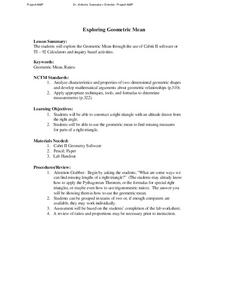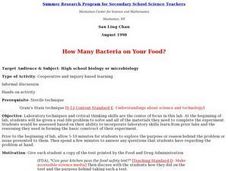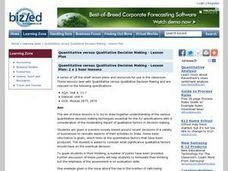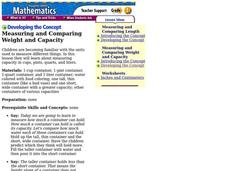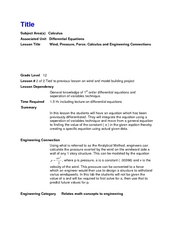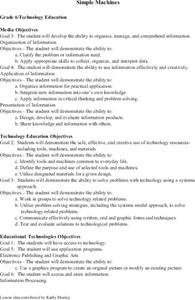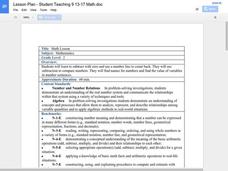Curated OER
Commutative Property
First graders use various models to learn the Commutative Property of Addition. In this Commutative Property lesson, 1st graders use other students, counters, balances, and dominoes to apply the addition property. Students solve addition...
Curated OER
Mental Math: Addition and Subtraction
Fourth graders exercise their minds in completing mental math skills of adding and subtracting by making multiplies of ten. They compute problems involving multiplication and division of whole numbers and addition and subtraction of...
Curated OER
Surveying: 19 Chains and 50 Links
Through an interdisciplinary instructional activity, emerging engineers explore the history of surveying systems. After discussing various systems, they perform surveys on printable pages. Using their geometric skills, they physically...
Curated OER
People Take the Stand
Students learn how to be a philanthropist. In this community lesson, students define words associated with philanthropy. Students read Sadako and the Thousand Paper Cranes and discuss the problem and how it was solved. Students...
Curated OER
Biological Succession in a Microecosystem
Young scholars investigate the concept of biological succession by simulating the process in a microenvironment with various microorganisms. By engaging in a lab, students determine the factors causing succession and learn population...
Curated OER
Civil War Research
Eighth graders research different aspects of the Civil War using various multi-media techniques. Students create a report based on their research that includes views of the war from the point of view of the North, South and slaves.
Curated OER
Advertising and Consumerism of the 1920's
Eleventh graders discover the impact of advertising in 1920's America. In this 20th century history instructional activity, 11th graders complete KNU charts as they research marketing techniques that were used during the decade to...
Curated OER
Estimating With Fire
Students solve problems with percents, decimals and fractions. In this algebra lesson plan, students convert between fractions, percents and decimals. They estimate their answers and calculate their answer.
Curated OER
Exploring Geometric Mean
Students solve problems using geometric means. In this geometry lesson, students create altitudes in right triangles. They use Cabri software to move the triangle around and observe different sides and angles.
Curated OER
Sketching Cylinders
Learners create nets of cylinders. In this geometry lesson, students calculate the surface area of cylinders and other solids. They show their understanding of three-dimensional shapes by solving problems.
Curated OER
Trigonometric Ratios
Students measure and analyze angles. In this trigonometry lesson plan, students measure angles and distances use non-traditional techniques. They identify the different ratios of sine, cosine and tangent.
Curated OER
Determine the molarity of an unknown HCl solution
Students complete a lab to help develop a comprehension of stiochiometry. They review equation writing, equation balancing, and stiochiometry. Studnets are given the following information: Sloppy students from the previous class have...
Curated OER
How Many Bacteria on Your Food?
Students discuss and conduct a food safety experiment which looks at bacteria and food poisoning. They swab the other area of some food and grow bacteria in an agar plate.
Curated OER
Separation of a Complex Mixture
Students develop a method to separate different types of mixtures. In this chemistry activity, students model the steps in the scientific method. They perform the experiment and analyze data.
Curated OER
Quantitative versus Qualitative Decision Making
Students analyze the advantages and disadvantages of different quantitative methods. They identify at least three different qualitative factors in decision making and explain the impact of qualitative decision-making factors in relation...
Curated OER
Acid and Rain and Its Effects
Young scholars work in groups for up to three weeks to investigate the possibility of acid rain in your area and to investigate the damage that acid rain can do to buildings, monuments, and plants. Each group prepares a report to local...
Curated OER
Math & Science
Students are introduced to techniques to help with with math and science. In groups, they use a worksheet to discover how to count money. As a class, they watch a PowerPoint to define terms associated with science. To end the lesson,...
Curated OER
Measuring and Comparing Weight and Capacity
First graders explore the concept of measurement. In this measurement lesson, 1st graders explore measurement techniques as they use containers to measure capacity. Students also practice solving problems that their instructors model.
Curated OER
Five E Lesson Plans For Math
Students use the Five E method to solve problems. In this Five E lesson, students complete math lessons using the Engage, Explore, Explain, Elaborate, and Evaluate technique. They use the Five E's with lessons on tessellations, magnets,...
Curated OER
Wind, Pressure, Force, Calculus and Engineering Connections
Twelfth graders solve first order differential equations using the separation of variables technique. In this calculus lesson, 12th graders explain the connection between math and engineering. They brainstorm what engineers do in real life.
Curated OER
Simple Machines
Sixth graders explore simple machines. They identify tools and machines that are used in everyday life. Students examine the purpose and uses of everyday tools. They create a tool or machine that can be used to solve a problem.
Curated OER
The Tiled Courtyard
Fifth graders use the guess and check technique to solve a problem involving transformations. They work with a grid and criteria provided by the teacher to solve a sequence with black and white rows.
Curated OER
Number Line Math
Second graders use a number line to practice subtraction. For this subtraction lesson, 2nd graders use a number line to count backwards. Students participate in mad math activities and solve problems.
Curated OER
Brian's Pegboard II
Students are able to assess a problem and use systematic methods to solve the problem. They also find out all the possible outcomes for a sequence of events using tree diagrams.










